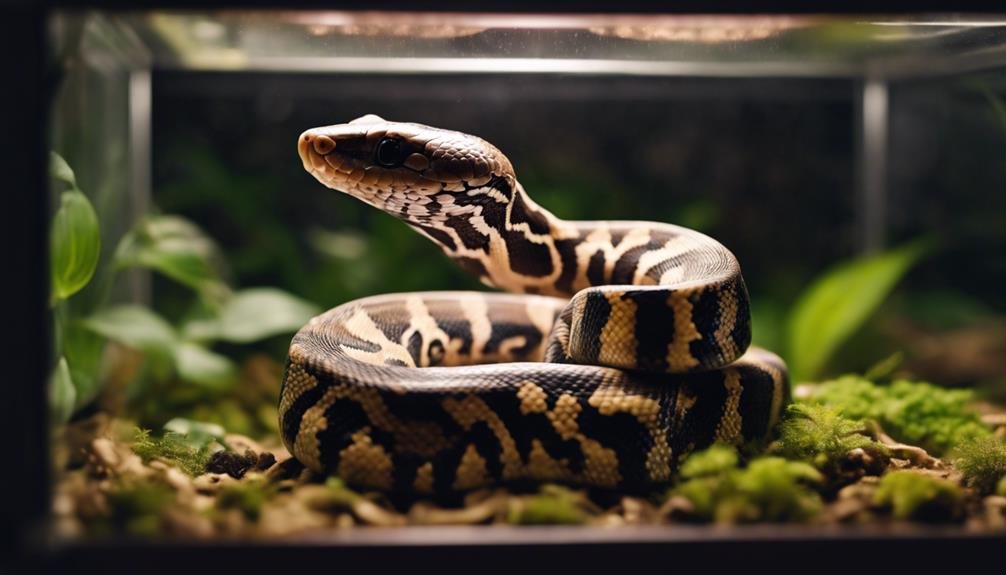You might wonder whether your ball python needs UVB lighting in its enclosure. Given their nocturnal nature and preference for dimly lit environments, it’s easy to assume that UVB isn’t a necessity. However, the benefits of UVB light, from boosting their immune system to improving bone health, can’t be overlooked. While they may not rely on it for survival as much as other reptiles, whether to include UVB lighting in their habitat setup isn’t as straightforward as it seems. Let’s explore why making an informed decision could significantly impact wellbeing and longevity.
Key Takeaways
- Ball python’s well-being is affected by UVB exposure for immune system enhancement and disease resistance.
- UVB is not essential for survival but can improve the quality of life in captivity.
- Mimicking natural conditions, UVB supplementation supports healthier growth and vitality.
- While not heavily dependent on sunlight, UVB aids in vitamin D3 production for calcium absorption.
- Ball pythons have less critical need for UVB than diurnal reptiles, but occasional exposure is beneficial.
Understanding UVB Light
UVB light plays an essential role in the health of reptiles, including lizards, by aiding in the production of vitamin D3, which is necessary for calcium absorption and bone development. This type of light isn’t just essential for these cold-blooded creatures; it’s required. When reptiles bask in UVB light from the sun or a synthetic source, it kickstarts a process in their skin that leads to the creation of vitamin D3. Without enough of this light, they can’t properly metabolize calcium, leading to soft, weak bones and potentially fatal conditions like metabolic bone disease.
UVB light is crucial for diurnal species that are active during the day. They’ve evolved to soak up the natural un, regulating their vitamin D3. However, it’s a common misconception that all reptiles, regardless of their lifestyle, have the same UVB needs. Take Ball Pythons, for example. Being nocturnal, they don’t bask in the sunlight for vitamin D3. Instead, they rely on their diet to meet their needs. Yet, this doesn’t mean UVB light holds no value for them. Occasional exposure can still support their immune system, making it an important, if not essential, part of their care.
Ball Pythons in Captivity
While it’s evident that ball pythons in their natural habitats aren’t heavily dependent on sunlight, when we bring them into our homes, understanding how to replicate their environment and basement becomes essential to their health. You might wonder if Ball Pythons need a UVB bulb in capita. It? The answer isn’t straightforward. Although they’re primarily nocturnal and crepuscular, thriving without direct sunlight, occasional UVB exposure can offer benefits.
Incorporating UVB into their captive habitat isn’t about survival but about enhancing their quality of life. A UVB bulb can potentially improve the immune system of your Ball Python, giving them a health boost similar to what they might encounter, albeit minimally, in the wild. This doesn’t mean that UVB is a must-have for these snakes, but it’s a consideration for those looking to go the extra mile in pet care.
Understanding the specific care requirements of Ball Pythons is important. Their environment should mimic their natural conditions as closely as possible, with or without UVB. While UVB supplementation can be beneficial, it’s not a substitute for proper husbandry and should be viewed as a potential addition to a well-thought-out captive environment.
Natural Habitat Insights
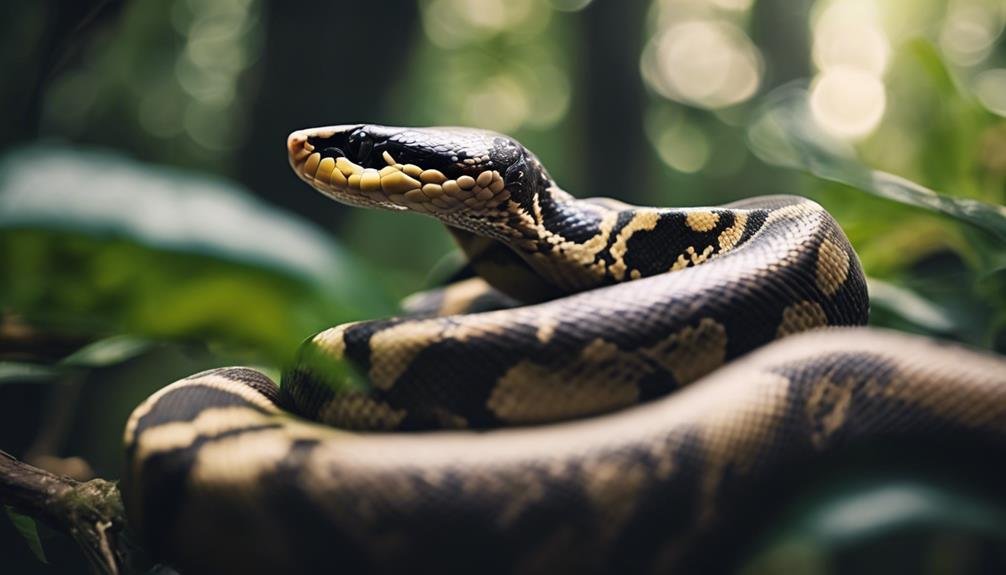

To fully comprehend why ball pythons may not strictly need UVB lighting in captivity, exploring their natural habitat, where they thrive underground and in dimly lit environments without direct sunlight, is crucial. These snakes are nocturnal and crepuscular, meaning they’re most active during the cooler, dimmer times of dawn and dusk. This behavior suits their needs perfectly, as it allows them to avoid the harsh daytime sun and hunt with the cover of twilight.
Their natural habitat includes shrublands, open forests, and wooded areas, where they can easily find shelter and warmth without needing direct sunlight. Instead of basking in UVB rays, ball pythons receive warmth from ambient temperatures and ground heat, which adequately supports their metabolic processes.
| Aspect | Description |
|---|---|
| Activity Pattern | Nocturnal and crepuscular, avoiding direct sunlight |
| Primary Heat Source | Ambient temperatures and ground heat, not UVB radiation |
| Habitat | Shrublands, open forests, wooded areas – underground and dimly lit |
| UVB Requirement | Not necessary for survival, but occasional supplementation could offer health benefits. |
Understanding this, it’s clear that while UVB lighting isn’t a strict requirement for ball pythons, their natural nocturnal behavior and unique habitat dictate their needs.
UVB for Bone Health
Understanding the role of UVB in reptile health is crucial. It plays a key role in bone development by facilitating vitamin D3 production, essential for calcium absorption in ball pythons. While these nocturnal creatures don’t bask like some reptiles, incorporating UVB lighting into their habitat can greatly benefit their health, particularly by preventing metabolic bone diseases from inadequate calcium absorption.
- Emotional Connection: Imagine your ball python moving with ease and grace, its body strong and bones robust, thanks to the right UVB lighting setup. It’s about providing a quality of life that mimics the natural wonders of their original habitats.
- Health Investment: Enhancing their environment with UVB lighting is an investment in their long-term health, preventing the heartache of seeing them suffer from preventable conditions.
- Peace of Mind: Promoting their well-being bone well-being. You’re doing right by your scaly friend.
While diurnal reptiles need direct UVB exposure for vitamin D3 synthesis, providing UVB lighting for ball pythons supports their health in a subtler yet profoundly beneficial way.
Comparative Needs: Snakes Vs. Lizards
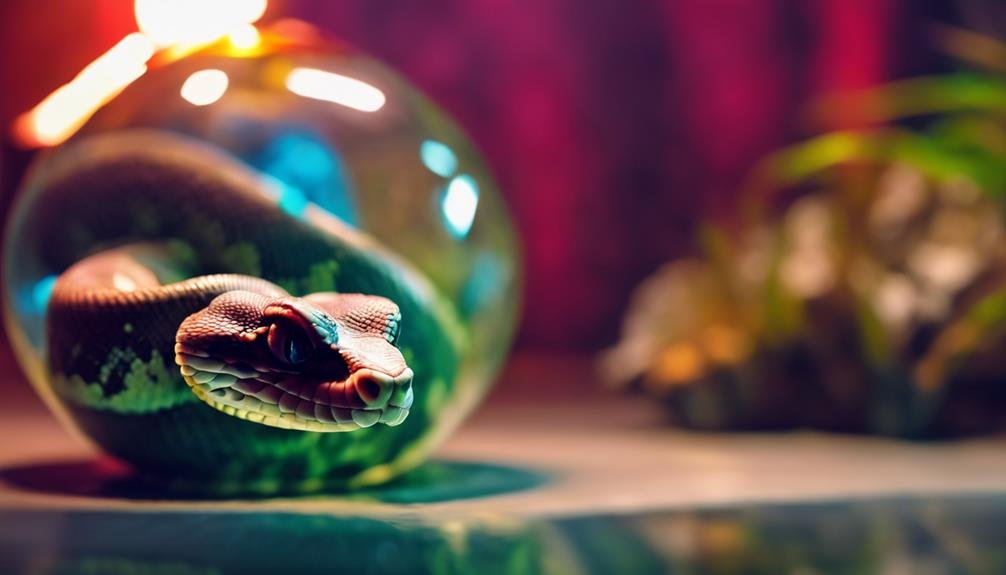

When comparing snakes and lizards, it’s important to recognize that snakes generally require less UVB due to their ability to derive vitamin D3 from their diet. This fundamental difference underscores the varied needs of these reptiles. While snakes can often bypass the need for direct UVB exposure, some diurnal species still benefit from it for overall health, highlighting that UVB isn’t entirely off the table.
Conversely, lizards, like bearded dragons and iguanas, have a much higher demand for UVB lighting. Their dependence on sun basking to absorb UVB rays is critical for vitamin D3 synthesis. Without adequate UVB exposure, lizards risk developing metabolic bone diseases, severely impacting their health and lifespan. This necessity for UVB lighting in their habitats can’t be overstated, as it plays a pivotal role in ensuring their bones develop properly and remain healthy.
Understanding these differences is key. While you might find some overlap, like the occasional snake benefiting from UVB, the rule of thumb is clear: lizards rely on UVB lighting far more than snakes to meet their physiological needs, especially for vitamin D3 synthesis and bone health.
Lighting Setup Recommendations
Considering the unique needs of ball pythons, let’s explore the best lighting setups for their enclosures. Unlike other reptile pets, ball pythons are nocturnal creatures that don’t require UVB light to survive. However, incorporating UVB lighting can greatly enhance their health and immune system. While it’s not essential, providing a UVB light bulb in the ball python enclosure could offer benefits beyond basic survival, promoting a more vibrant and active lifestyle for your scaly friend.
For those looking to meet their ball python’s Lighting Needs without UVB, a compact fluorescent bulb is a suitable choice. It mimics ambient room light, allowing your pet to see and navigate their habitat comfortably. Remember, the goal is to create an environment that feels as natural as possible for your ball python, ensuring they thrive under your care.
- Create a comforting environment with gentle lighting that mimics their natural habitat.
- Enhance their well-being by UVB light, which contributes to their well-being. Your setup with ambient room lighting or a compact fluorescent bulb to ensure they’re not left in the dark.
Heat Lamp Necessities
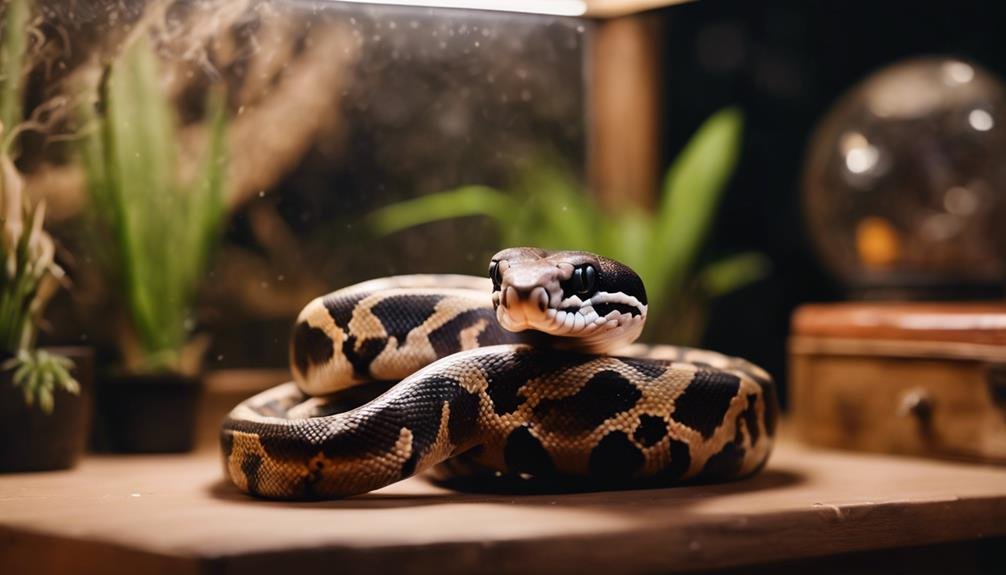

Providing a reliable heat source in your ball python’s enclosure is important to guarantee its health. Heat lamps equipped with incandescent bulbs are popular, as they deliver the necessary warmth without emitting UVB, which isn’t needed for your snake’s wellbeiwellbeinglamps can effectively maintain the wellbeinwellbeingball python, which it needs to thrive.
However, it’s not just about choosing any heat lamp. Opting for quality bulbs, like Fluker’s Daylight Neodymium bulb, ensures your pet is exposed to suitable heat levels without any adverse effects. It’s crucial to pair these heat sources with a thermostat. This device plays a key role in regulating the temperature, preventing the enclosure from becoming too hot or too cold, which could harm your pet.
Besides heat lamps, there are alternative heating options such as heat pads and radiant heat panels. These can be placed under or on the sides of the enclosure, providing a consistent heat source. Each alternative offers a way to keep your ball python warm, ensuring their habitat is as comfortable and close to their natural environment.
Day-Night Cycle Importance
Understanding the importance of a consistent 12-hour day-night cycle is essential for your ball python’s health and behavioral regulation. This precise regulation of light and darkness plays a significant role in maintaining your snake’s circadian rhythm, which is necessary for its overall well-being.In the well-beingg cycle, your ball python will experience elevated stress and behavioral issues that could impact its quality of life.
Implementing a stable day-night cycle isn’t just about turning a light on and off; it’s about mimicking the natural environment to which ball pythons are adapted. They rely on this cycle for critical activities like hunting and digesting their meals. Automating this cycle with a lamp timer can promote consistency, reducing the chances of disrupting your snake’s internal clock.
Consider these points to grasp the day-night cycle importance truly:
- Stress Reduction: A consistent cycle helps minimize stress, creating a more serene environment for your ball python.
- Behavioral Regulation: It aids in preventing behavioral issues, fostering a more predictable and calm demeanor.
- Enhanced Natural Instincts: Proper lighting cycles support natural behaviors such as hunting and digestion, which are crucial for your snake’s health.
Immune System Benefits
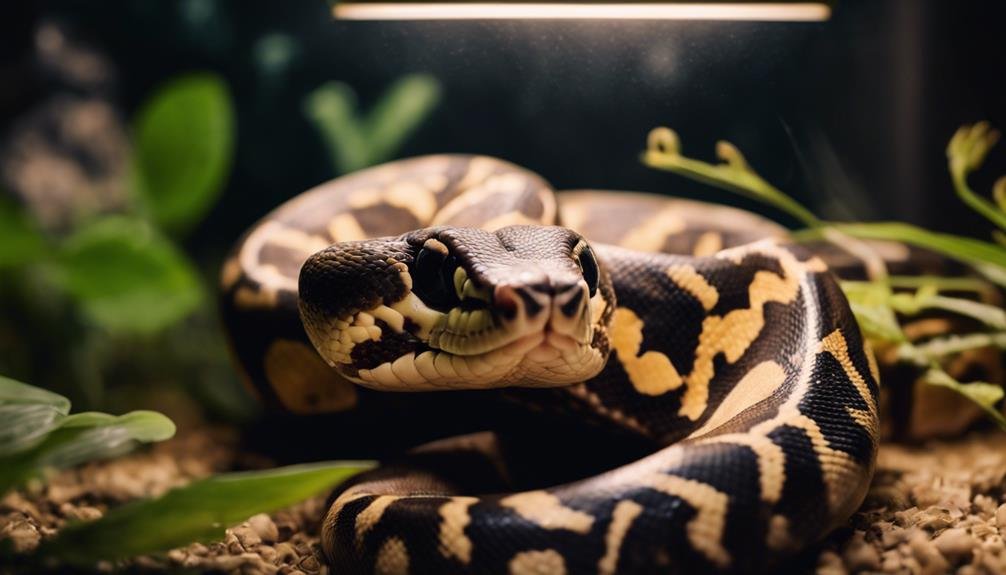

When considering UVB lighting for your ball python, it’s important to understand how it can enhance its immune system. UVB exposure is key to their well-being by promoting wellness and disease resistance.
This can lead to more robust health and well-being as a beneficial addition to their habitat.
Enhancing Disease Resistance
Exposing your ball python to UVB light can greatly enhance its immune system, aiding the fight against diseases and infections. With UVB exposure, their body can produce more vitamin D3, a critical component for immune health. This bolsters their disease resistance and improves their ability to ward off pathogens. You’re taking a significant step toward ensuring their health and longevity by providing your ball python with adequate UVB lighting.
- UVB exposure boosts the immune response, strengthening your ball python against invaders.
- Increased vitamin D3 production supports a healthy immune system, arming your pet against illness.
- Enhanced disease resistance means fewer vet visits and more quality time with your resilient companion.
Promoting Healthier Growth
UVB light not only strengthens your ball python’s immune system but also plays an essential role in promoting healthier, more robust growth. By enhancing vitamin D3 production, UVB exposure guarantees your snake’s body can effectively absorb calcium. This is essential for developing strong bones and preventing metabolic issues.
While you might think your ball python can do without it, providing occasional UVB light boosts their overall health and vitality. It supports their metabolic processes, making them more active and lively. Understanding these benefits, you’ll see how UVB exposure contributes to a more enriched and balanced lifestyle for your ball python, making it worth considering for their care regimen.
Do UVB Lights Affect Ball Pythons’ Ability to Hear and Detect Sound Waves?
UVB lights do not directly affect a ball python’s sound detection system. These snakes rely on their keen senses to detect vibrations and low-frequency sound waves, using their specialized jawbones as receptors. It’s crucial to provide adequate environmental enrichment to support their natural behaviors.
Making an Informed Decision
To make an informed decision about using UVB lighting for your ball python, it’s important to weigh the potential health benefits against the fact that they don’t require it for survival. Understanding that ball pythons are naturally nocturnal and crepuscular creatures, which means they’re not reliant on direct sunlight for their day-to-day existence, is key in this decision-making process. However, enhancing their health through UVB exposure can’t be overlooked.
UVB lighting can boost the immune system of your ball python, and even though it’s not a necessity for their basic needs, it sets a foundation for informed decision-making. Here are a few points to stir your thoughts and feelings on the matter:
- Imagine your ball python with a stronger immune system, all because you decided to provide that extra care.
- Feel the peace of mind knowing you’re offering more than just the basics for survival.
- Visualize your ball python thriving, possibly enjoying a better quality of life with your informed choice.
Ultimately, investing in a UVB light bulb might be a personal decision aimed at potentially improving your ball python’s health and well-being.
Conclusion
In conclusion, the well-being of ball python wells needs UVB light for survival, and incorporating it into their habitat can greatly enhance their well-being. Your well-being means bone health, immune system, and overall well-being.
Mimicking a pet’s holistic well-being, including the well-being cycle and well-being, supports its long-term well-being. So, while essentials for well-being are important, UVB light is a wise choice for any ball python owner wanting to guarantee their pet thrives.
FAQs
1. Does My Ball Python Need UVB Light?
You don’t need to provide UVB light for your ball python as they naturally thrive without it. However, occasional UVB exposure might enhance skin health, support natural behaviors, and improve dietary absorption and activity levels.
While it’s not essential, adding a UVB source could mimic your pet’s natural environment and offer potential health benefits. Consult a reptile vet to decide if UVB supplementation is right for your pet.
2. Do Snakes Need Uvb?
You may wonder if snakes need UVB light. Generally, they don’t because their natural behaviors don’t include basking like some reptiles. Their diet mainly affects their skin health and nutrient absorption, especially vitamin D3.
However, UVB might offer environmental enrichment for some snakes, mimicking their natural habitat. But for ball pythons, it’s unnecessary since they’re nocturnal, and UVB isn’t essential for their wellbeing.
3. Do well-being need a well-being
You do well being a lamp for your ball python. They thrive without UVB lighting, as it’s not essential for their survival or health. However, a sun lamp can be their enclosure by mimicking a natural day-night cycle, stimulating natural behaviors, and even reducing stress.
It’s more about decoration and creating a comfortable environment than meeting a significant need, so it’s your call to add one.
4. Does a Ball Python Need a Heat Lamp?
You don’t necessarily need a heat lamp for your ball python, but it helps with temperature regulation. Setting up an enclosure with a heat source creates a comfortable environment miming their natural habitat.
Supportive Article
Dangers of Insufficient UVB for Ball Pythons

